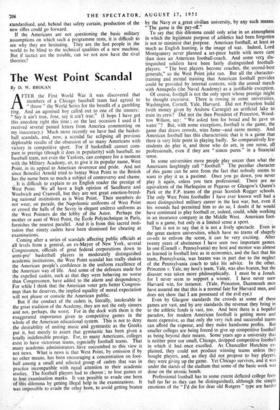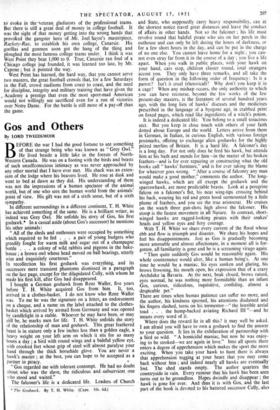The West Point Scandal
By D. W. BROGAN FTER the. First World War it was discovered that members of a Chicago baseball team had agreed to " throw " the World Series for the benefit of a gambling ring. And an agonised boy called out to one of the sinners: " Say it ain't true, Jose, say it ain't true." (I hope I have, got this anecdote right this time ; on the last occasion I used- it I received several pained letters from America commenting on my inaccuracy.) Much more recently we have had the basket- ball scandals, and, now, a scandal far eclipsing all previous deplorable results of the obsession of so many Americans with victory in competitive sport. For if basketball cannot com- pare in prestige (though it does in popularity) with baseball, no baseball team, not even the Yankees, can compare for a moment with the Military Academy, or, to give it its popular name, West Point, in its appeal to American reverence and pride. And not since Benedict Arnold tried to betray West Point to the British has the name been so much a subject of controversy and shame.
It is difficult to explain to an English reader the prestige of West Point. We all have a high opinion of Sandhurst and Woolwich and Cranwell, but they are not great emotion-breed- ing national institutions as is West Point. Their members do not wear, on parade, the Napoleonic uniforms of West Point or crowd the halls of the Savoy in elegant undress uniforms as the West Pointers do the lobby of the Astor. Perhaps the mother or aunt of West Point, the Ecole Polytechnique in Paris, furnishes the nearest parallel. And it is from this sacred insti- tution that ninety cadets have been dismissed for cheating at examinations.
Coming after a series of scandals affecting public officials at all levels from a general, an ex-Mayor of New York, several Congressmen, officials of great federal corporations down to semi-pro' basketball players in moderately distinguished academic institutions, the West Point scandal has really shaken the American people's confidence in the uniform excellence of the American way of life. And some of the defences made for the expelled cadets, such as that they were behaving no worse than Congressmen, have added to the alarm and despondency. For while I think that the American voter gets better Congress- men than he deserves, the implied equality of moral expectation will not please or console the American public. But if the conduct of the cadets is, literally, intolerable in the great tradition of the Academy, they are not the only sinners and not, perhaps, the worst. For in the dock with them is the exaggerated importance given to competitive games in the whole of the American educational system. This is not to deny the desirability of uniting music 'and gymnastic as the Greeks put it, but merely to assert that gymnastic has been given a totally indefensible prestige. For; to many Americans, colleges exist to have victorious teams, especially football teams. That many academic administrators Ave succumbed to this view is not news. What is news is that West Point, by omission if by no other means, has been encouraging a concentration on foot- ball 'among a small and selected, group of cadets that was in practice incompatible with equal attention to their academic studies. The football players bad to • choose ; to lose games or to lose examination marks. It was possible to evade one horn of this dilemma by getting illegal help in the examinations. It was impossible to evade the other horn, to avoid getting beaten by the Navy or a great civilian• university, by an,y such means. " The game is the pay-off."
To say that this dilemma could only arise in an atmosphere in which the legitimate purpose of athletics had been fOrgotten is not td minimise that purpose. American football, at least as much as English hunting, is the image of war. Indeed, Lord Montgo,mery never planned a set-piece battle with more care than does an American football-coach. And some very dis- tinguished soldiers have been fairly distinguished football- players. " The best players become coaches, the second-best generals," so the West Point joke ran. But all the character- training and mental training that American football provides could be provided by internal contests, with the annual match with Annapolis (the Naval Academy) as a justifiable exception. Of course, footpall is not the only sport whose prestige might be thought excessive. There is rowing in some universities, Washington, Cornell, Yale, Harvard. Did not Princeton build (with money given by Andrew Carnegie) an artificial lake to train its crew? Did not the then President of Princeton, Wood- row Wilson, say: " We asked him for bread and he gave us water "? But, with some excepGons, football is the game, the game that draws crowds, wins fame—and earns money. And American football has this characteristic that it is a game that there is very little point in playing badly. ,So comparatively few students do play it, and those who do are, in one sense, all professionals, even if they are " simon pures " in a financial sense.
In some universities more people play soccer than what the Americans laughingly call " football." The peculiar character of this game can be seen from the fact that nobody seems to want to play it as a pastime. Once you go down, you never play it again, unless you turn professional. There are no equivalents of the Harlequins or Pegasus or Glasgow's Queen's Park or the F.P. teams of the great Scottish Rugger schools. The only West Point footballer I have ever known well had a most distinguished military career in the last war, but, even if his wounds had 'permitted him to do so, I doubt if he would have continued to play football or, indeed, could, while working in an insurance company in the Middle West. American foot- ball is a game, but only in a limited sense a sport.
That is not to say that it is not a lively spectacle. Even in the great eastern universities, which have no teams of shapely co-eds to enliven the scene, it can be very exciting. After twenty years of abstinence I have seen two important games. In one (Cornell v. Pennsylvania) my host and mentor was almost as learned in football lore as in economics, and the fact that his team, Pennsylvania, was beaten was in part due to the neglect of the Pennsylvania coach to take his advice. In the other, Princeton v. Yale, my host's team, Yale, was also beaten, but the disaster was taken more philosophically. I must be a Jonah, for I never seem to support a winner. I have never seen Harvard win, for instance. (Yale, Princeton, Dartmouth men have assured me that this is a normal fate for Harvard men, and does not show that I am possessed of the evil eye.) Even by Glasgow standards the crowds at some of these games are vast, and by any standards the revenue they bring in to the athletic funds is vast, too. And here there is a hopeful paradox, for modern American football is getting more and more expensive, so that only the very rich and successful teams can afford the expense, and they make handsome profits. But smaller colleges are being forced to give up competitive football as being beyond their means. Some years ago .a university that is neither poor nor small, Chicago, dropped competitive football in which it had, once excelled. As Chancellor Hutchins ex- plained, they could not produce winning teams unless they bought players, and, as they did not propose to' buy players. they were giving up the game. Yet Chicago survives, and it was under the stands of the stadium that some of the basic work was done on the atomic bomb.
Professional football has to some extent deflated college foot- ball (as far as they can be distinguished), although the simple emotions of the " I'd die for dear old Rutgers " type are harder to evoke in the 'veteran gladiators of the professional teams. But there is still a great deal of money in college football. It was the sight of that money getting into the wrong hands that provoked the gangster hero of Mr. Joel Sayre's masterpiece, Rackety-Rax, to establish bis own college, Canarsie. His gorillas and gunmen soon got the hang of the thing and ploughed the most famous college teams under. I think it was West Point they beat 1,000 to 0. True, Canarsie ran foul of a Chicago college just founded, it was learned too late, by Mr. Capone ; but it pointed the way.
West Point has learned, the hard way, that you cannot serve two masters, the great football crowds that, for a few Saturdays in the Fall, crowd stadiums from coast to coast, and the need for discipline, integrity and military training that have given the a Academy a prestige that even the most sport-mad American would not willingly see sacrificed even for a run of victories over Notre Dame. For the battle is still more of a pay-off than the game.































 Previous page
Previous page